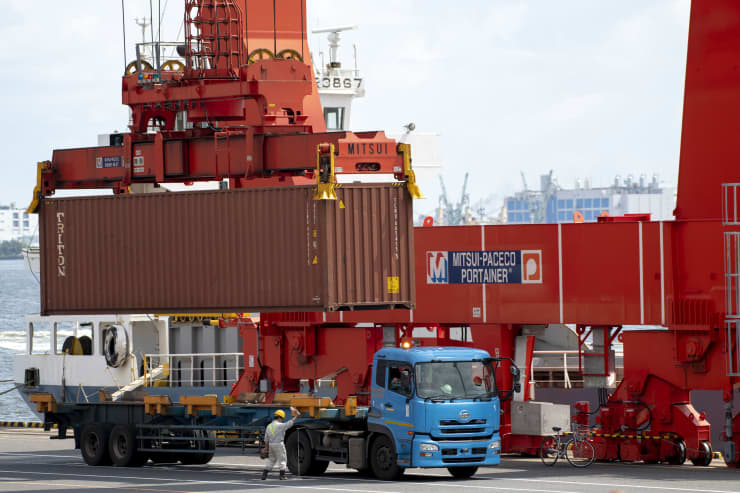Tension between Japan and South Korea is rising, and it looks set to drag down trade
- Tensions between Tokyo and Seoul are intensifying after Japan imposed new restrictions on exports that could hit South Korea’s tech industry.
- One analyst suggests the situation could escalate further, with the two governments engaging “in a tit-for-tat exchange of retaliatory measures for at least the several months that further sours bilateral relations.”
- The recent tensions between the two countries stem from more than six decades of resentment from South Korea toward Japan. During the Japanese occupation of the Korean Peninsula from 1910 to 1945, many Korean women were forced into sex work in military brothels.

South Korean President Moon Jae-in (R) walks after he was greeted by Japanese Prime Minister Shinzo Abe at the G-20 Summit in June 2019. Kim Kyung-Hoon | AFP | Getty Images
Tensions between Tokyo and Seoul intensified on Friday when Japan’s prime minister imposed new restrictions on exports that could hit South Korea’s tech industry. In response, some Koreans called for a boycott on Japanese goods.
As the United States and China, the world’s two largest economies, continue hashing out their wide-ranging tariff battle. Two of Asia’s major economic players appear to be nearing their own trade war over political disputes.
“The two governments will engage in a tit-for-tat exchange of retaliatory measures for at least the several months that further sours bilateral relations,” Scott Seaman, director for Asia at political consultancy Eurasia Group, said in a Sunday note.
The latest escalation seems in part to have been caused by Japanese Prime Minister Shinzo Abe and South Korean President Moon Jae-in failing to make progress on outstanding disagreements at last month’s G-20 summit.
According to Seaman, Abe “appears to have been particularly irked” by the failure to resolve “differences over the handling of recent South Korean court rulings awarding damages to Koreans claiming to have been forced to work for Japanese firms during World War II.”
Last Monday, Japan’s Ministry of Economy, Trade, and Industry issued a statement that Tokyo “will apply updated licensing policies and procedures on the export and transfer of controlled items and their relevant technologies to (South Korea).”
“Through careful consideration among the relevant ministries in Japan, the Government of Japan cannot help but state that the Japan-(South Korea) relationship of trust including in the field of export control and regulation has been significantly undermined,” the statement said.
Additionally, Tokyo removed South Korea from the list of “white countries” — countries that Japan deems to have trustworthy export control systems.
The recent tensions between the two countries stem from more than six decades of resentment from South Korea toward Japan. During the Japanese occupation of the Korean Peninsula from 1910 to 1945, many Korean women were forced into sex work in military brothels. The term “comfort women” has often been used by Japan as a euphemism for all the women forced into sex work in the region during WWII.
Japan apologized to the women as part of a 2015 deal and provided a 1 billion yen, approximately $9.4 million, fund to help them.
But advocacy groups for “comfort women” in Korea have criticized the fund, and the South Korean government on Friday dissolved the fund despite Japan’s warnings that such action could damage bilateral ties.
Tokyo’s changes to its approach to South Korean trade went into effect on Thursday, and Japanese exporters are now required to apply for licenses for some individual shipments to South Korea. That will include exports of chemicals mostly used for making refrigerants, pharmaceutical intermediates, metals manufacturing, and sometimes semi-conductor preparations.
Seaman wrote that the “change is expected (and arguably intended) to complicate and slow the process of exporting these goods from Japan to South Korea.”
“Bulk licenses can, in principle, cover three years of shipments,” he added. “In contrast, applying for an export license for individual shipments can take 90 days or so to complete, with no guarantee of success, thus creating more uncertainty and potential costs.”

Meanwhile, the removal of South Korea from Japan’s list of “white countries” is set to go into effect in late August.
“Broadly speaking, the current group of 27 white countries are those that Japan considers having strict export control regimes and with which it can hold regular discussions on such matters,” said Seaman. He added that Japan normally tries to discuss with “white countries” the handling of such items at least once every two years.
Seaman pointed out that “Tokyo and Seoul have reportedly had only one such exchange since 2016, and none since Moon took office in May 2017.” That, he added, further underpins “the Abe government’s argument that trust in this area has broken down.”
Seaman said the measures implemented by the Abe administration seem to be targeting South Korean tech industries such as smartphones and semiconductors. That may incite negative reactions among the citizens of the two Asian powerhouses.
“A spike in bad feelings between Japan and South Korea will likely weaken the desire of people in both countries to buy products made by the other or to visit as tourists,” said Seaman.
More importantly, looking ahead, neither Abe nor Moon are going to want to look “weak” ahead of upcoming elections said, Seaman.
“Abe will not want to appear weak ahead of upper house elections on 21 July, and Moon will likewise be loath to back down as he and his party ramp up preparations for National Assembly elections in April 2020.”
Seaman said the tension may spur Japanese and South Korean businesses to “lobby their respective governments — albeit quietly — to seek a face-saving way to prevent the outbreak of a debilitating, full-blown trade war.”
He added that, if tensions do continue to escalate, cooperation outside bilateral economic relations, such as coordinating “in efforts to manage North Korea and other regional threats” will become challenging.
— Reuter’s contributed to this report.
Source: https://www.cnbc.com/2019/07/08/japan-south-korea-tensions-appear-set-to-drag-down-trade.html